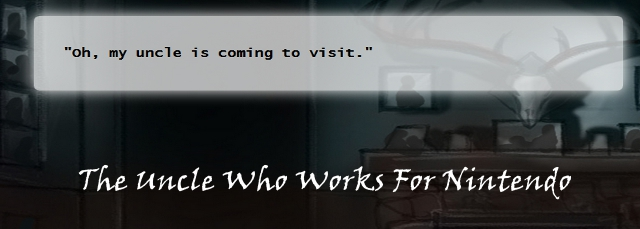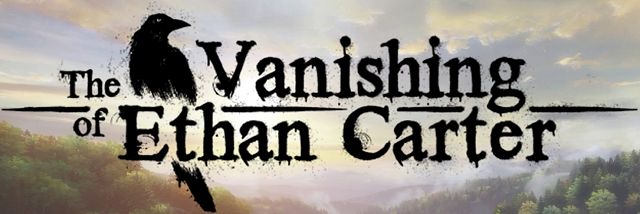Red Pages Podcast
GOTY 2014
Justin's GOTY
I'm going to put this fact first, front and center: I don't have a "Game of the Year" this year. While there were titles that I enjoyed, titles that impressed me, titles that disgusted me, titles that moved me, choosing a single game from all of this year's releases did not seem feasible to me. There was no single breakout hit that stood away from the crowd. Instead, I would like to highlight three titles that I found especially compelling. In no particular order, these are my "GOTYs," for all the meaning that such a dubious award implies.

The Uncle Who Works For Nintendo
The Uncle Who Works For Nintendo is a Twine game by Michael Lutz about a child's harrowing ordeal sleeping over at a friend's house the night the friend's titular Uncle comes for a visit. Drawing in equal parts from the early 90's playground one-upsmanship that surrounded knowledge about videogames in a pre-internet world and the Lovecraftian side of the creepypasta writing community, Lutz's minimal use of sound and a branching story structure that rewards repeated play and exploration shows how Twine, at its best, can be used to deliver a satisfying narrative experience that could not exist in a more traditional storytelling medium.
Listen to the Red Pages episode where Michael Lutz was a guest.

The Vanishing of Ethan Carter
The Vanishing of Ethan Carter is a short first-person exploration mystery from The Astronauts. Drawing heavily from Lovecraft's Weird Fiction tradition, detective Paul Prospero ventures to the Red Creek Valley to discover the disappearance of Ethan Carter, a young fan whose urgent letters to Prospero warned of something terrible lurking below Red Creek's placid woods, burbling streams and ramshackle houses. The game is visually stunning, but its real strength comes from the story that it tells. Elements are presented nonlinearly, as Prospero uses his supernatural powers to view what happened at various locations in the gameworld in an attempt to reconstruct what happened to Ethan. The deeper he goes down the rabbit hole of Ethan's world, the more both he and the player begin to question where Ethan's story is going, and where the line between narrator and character can be drawn.

Middle-earth: Shadow of Mordor
This award goes to Middle-earth: Shadow of Mordor not for a triumph of gameplay, superior graphical fidelity, stellar writing or even for positive use of a license. Mordor's triumph comes entirely from technical achievement in the service of emergent storytelling via its unique Nemesis System. I will leave it to IGN's wiki to describe the intricacies of the Nemesis System's workings, the possibilities opened for future titles to build upon such an elaborate set of NPC interactions and hierarchies is one of the most exciting prospects looking forward to the new year. While Mordor does not have especially striking moment-to-moment action and the gameplay is serviceable at its best, beneath the hood lies a technological feat that could potentially revolutionize emergent narrative going forward.